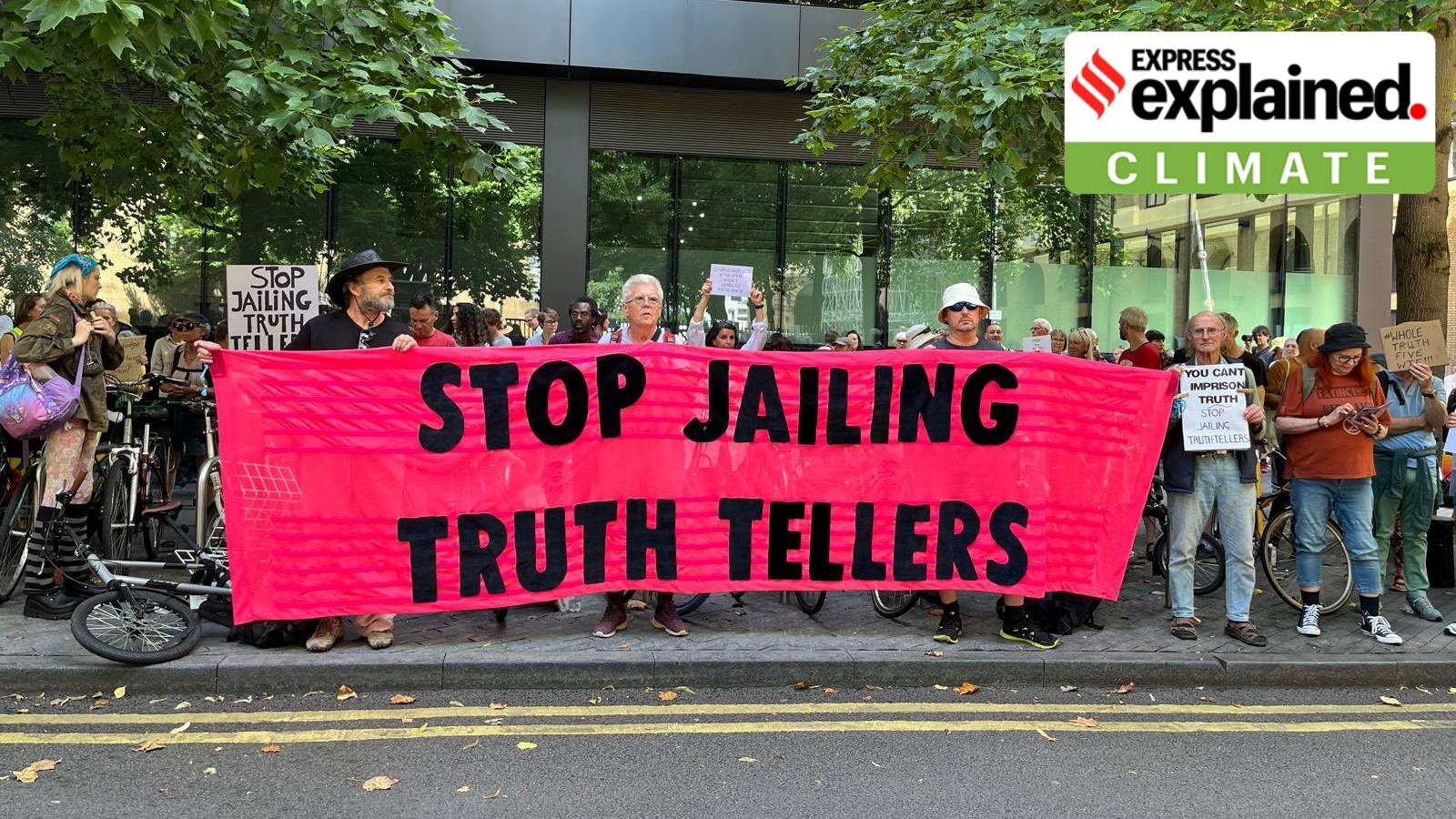How Just Stop Oil activists were slapped with ‘draconian’ prison sentences for a Zoom call
Five members of Just Stop Oil, a British environmental activist group famed for its disruptive in-your-face tactics, were slapped with unprecedented prison sentences for planning to block a British motorway
 Protestors outside the Southwark Crown Court on the day of the sentencing. (X/@DaleVince)
Protestors outside the Southwark Crown Court on the day of the sentencing. (X/@DaleVince)Five Just Stop Oil (JSO) activists, including one of its co-founders, on Thursday (July 18) were slapped with record jail sentences over protests that blocked the M25 motorway in November 2022.
Roger Hallam, 58, Just Stop Oil co-founder, was handed a five-year sentence, while the rest — Daniel Shaw (38), Louise Lancaster (58), Lucia Whittaker De Abreu (35), and Cressida Gethin (22) — were given four year sentences.
Key to the conviction and sentencing was a Zoom call which, according to the judgment, showed “how intricately planned the disruption was and the sophistication involved”, and was “compelling evidence” of the existence of a conspiracy.
Here is all you need to know about JSO, the Thursday convictions, and the reactions to it.
Who are Just Stop Oil?
JSO is a UK-based climate protest group founded in 2022, which focuses on the issue of human-caused climate change. JSO started with the mission to halt all new oil, gas, and coal projects in the UK — in which it was successful. Its new demand is for the UK to sign a “legally binding treaty to stop extracting and burning oil, gas, and coal by 2030, as well as supporting and financing other countries to make a fast, fair, and just transition”.
JSO is known for its highly disruptive actions, including blocking major roads, interrupting sports events like the Wimbledon and the Ashes, and its rather controversial actions at cultural sites. For instance, on July 5, 2022, protestors glued themselves to the frame of a copy of Leonardo da Vinci’s The Last Supper painting at the Royal Academy of Arts, London. More recently, on June 19 this year, JSO “vandalised” three of Stonehenge’s stones by spraying them with paint made of an orange corn flour.
JSO describes its tactics as “nonviolent civil resistance to put pressure on the UK government”. The group proclaims in its website: “We are going to cause disruption, making our demand unignorable”.
Why have five JSO activists been sentenced now?
For four straight days from November 7 to 11, JSO protestors climbed over road barriers on the M25, an extremely busy motorway circling most of the Greater London area, and blocked traffic.
Prosecutors claimed that these protests caused more than 50,000 hours of vehicle delay, affecting more than 7 lakh vehicles, and leading people to miss flights, medical appointments, exams, and all kinds of other important engagements. There was also a minor truck accident due to the blockade, and one police officer suffered a concussion and some bruising on November 9 after being knocked off his motorbike in the chaos. Prosecutors pegged the overall economic cost of the blockade at “at least 750,000 pounds, with the Metropolitan Police bearing a cost of more than 1.1 million pounds.
The five activists in question, however, were not convicted for taking part in the protest itself, but rather for its planning. On November 2, 2022, less than a week before the protests, all five activists were in a Zoom call, in which they discussed how the protests would be carried out, and what all would be done. The proceedings of this Zoom meeting were leaked by a journalist from The Sun, Britain’s most read tabloid, who had managed to join the call pretending to be interested in the protests.
The prosecution used this evidence to prove a conspiracy case against the activists. There was “extensive organisation and planning” for the protests and each defendant had a “significant role” in the conspiracy, prosecutor Jocelyn Ledward said in court.
The activists were convicted by a jury of conspiring to intentionally cause public nuisance on July 11, and sentenced by Judge Christopher Hehir of the Southwark Crown Court on July 18. During the sentencing, Hehir said that each of the convicted persons had “some time ago crossed the line from concerned campaigner to fanatic”, and that they orchestrated “a level of deliberate disruption never seen before”.
What has the reaction been to the sentencing?
The sentencing has been met with widespread criticism. Michel Forst, the UN Special Rapporteur for Environmental Defenders, said that these punishments may violate international human rights norms. “The harshness of the penalties seems to contradict the right to peaceful assembly,” he said.
Tom Southerden, Amnesty International UK’s Law and Human Rights Adviser, called the sentencing “draconian”. He said: “These lengthy jail sentences for people seeking climate justice should increase the alarm over the ongoing crackdown against peaceful protest in this country, which violates all our human rights.”
In a scathing op-ed for The Guardian, conservationist Chris Packham and green energy industrialist Dave Vince (often a critic of JSO’s methods) wrote: “These people [JSO] might be annoying. They might give you an earache. We might wish they would tone it down. But in a democratic society, they do not belong in prison. We need to be listening to them, not locking them up.”
Despite growing pressure, Labour Prime Minister Keir Starmer has refused to intervene. “The prime minister is very clear that when it comes to these cases, the judgments and sentencing is for independent judges to make,” Starmer’s spokeswoman said on Friday.
The author is an intern with The Indian Express
- 01
- 02
- 03
- 04
- 05






































